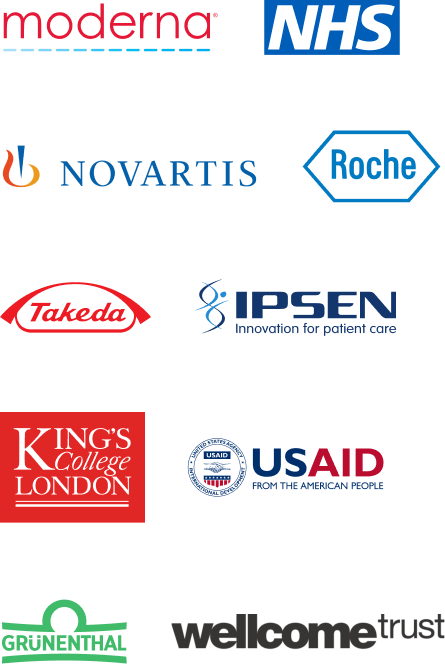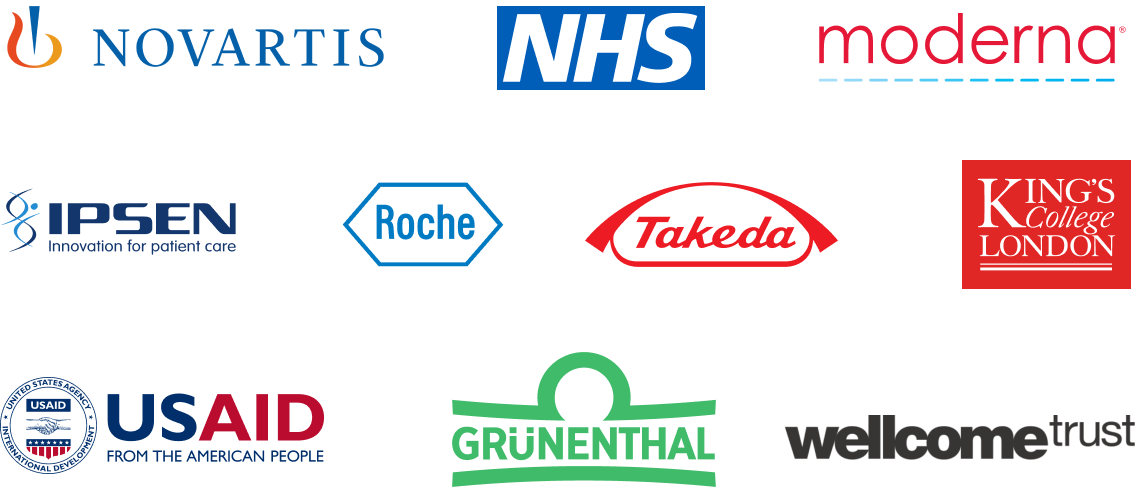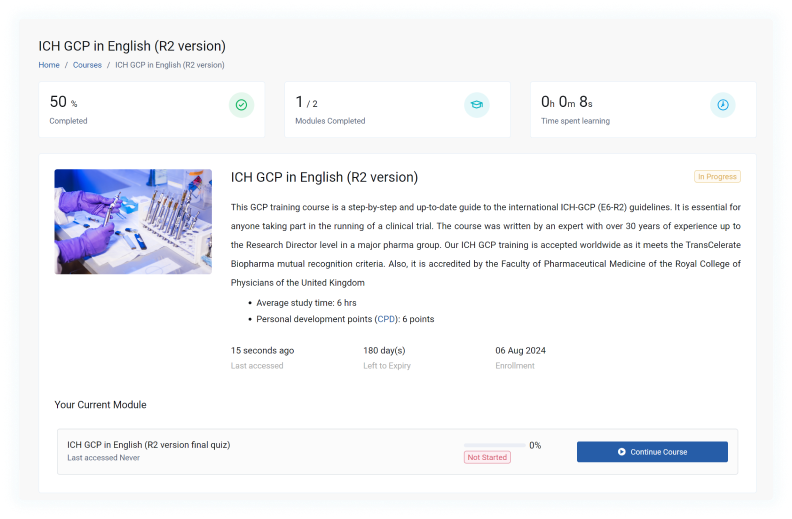Course Syllabus
- Basic Information
- What is GCP?
- Why should there be ICH GCP?
- IHC GCP Principles
- Details of GCP specific to France
- Some Basic Approaches
- Documentation and Version Control
- Quality Assurance (QA)
- Other Resources
- Introduction
- Responsibilities of the CA
- Responsibilities of the IEC
- Subject Informed Consent Forms (ICF): Part 1
- Subject Informed Consent Forms (ICF): Part 2
- Composition, Functions, Operations, Procedures, and Records
- IEC Interactions with Sponsors and Investigators
- Introduction
- Investigator Responsibilities
- Investigator Qualifications and Agreements
- Adequate Resources
- Medical Care of Trial Subjects: Part 1
- Medical Care of Trial Subjects: Part 2
- Communication with IEC
- Compliance with the Protocol
- Investigational Medicinal Products
- Randomisation Procedures and Un-blinding
- Informed Consent of Subjects to the Tests
- Data Collection and Expression of Results
- Informed Consent: The Consent Discussion
- Informed Consent: Subjects Who Cannot Read or Write
- Informed Consent: Minors and “Mentally Incompetent” Subjects
- Informed Consent: Incapacitated Subjects
- Informed Consent: Updating Consent
- Records and Reports: Introduction
- Records and Reports: Study Site Files
- Records and Reports: Updates & Amendments
- Records and Reports: Source Documents
- Records and Reports: Financial Information
- Records and Reports: The Case Record Form
- Records and Reports: Recording Subject Data
- Premature Termination or Suspension of a Trial
- Progress Reports and Final Reports by Investigator
- Archiving
- Introduction
- Quality Management: Part 1
- Quality Management: Part 2
- QA and QC (Quality Assurance and Quality Control): Introduction
- QA and QC (Quality Assurance and Quality Control): Standard Operating Procedures
- QA and QC (Quality Assurance and Quality Control): Agreements & Contracts
- Contract Research Organisations
- Medical Reports
- Trial Design
- Trial Management
- R2 Modifications
- Electronic Data Systems
- Record Keeping
- Investigator Selection: Introduction
- Investigator Selection: Permissions
- Investigator Selection: Responsibilities
- Investigator Selection: Compensation
- Financing
- Notification/ Submission to Regulatory Authorities
- Gaining CA Approval in the EU: Part 1
- Gaining CA Approval in the EU: Part 2
- Confirmation of Review by IRB/IEC
- Information on IMP
- Manufacturing, Packaging, Labelling, and Coding Investigational Products: Part 1
- Manufacturing, Packaging, Labelling, and Coding Investigational Products: Part 2
- Supplying and Handling Investigational Products
- Record Access
- Audit and Inspection
- Noncompliance
- Premature Termination or Suspension of a Trial
- Clinical Trial/Study Reports
- Multicentre Trials
- Introduction
- Monitoring: Introduction
- Monitoring: Monitor Responsibilities
- Monitoring: IMP Inspection
- Complying with the Protocol, Amendments, SOP and Guidance
- Verifying Informed Consent
- The Case Record Form (CRF) and Source Documents
- Verifying Subject Data
- Errors in Subject Data Recording Notebooks
- Closing out the Monitoring Visit
- The Monitoring Report & Plan
- Quality Management - Centralised Monitoring
- Fraud and Misconduct
- Introduction
- Reporting Adverse Drug Reactions: Adverse Events
- Reporting Adverse Drug Reactions: Serious Adverse Events
- Adverse Drug Reaction Reports
- Adverse Reactions of Special Events
- Periodic Safety Reports
- Reporting of Adverse Drug Reactions
- Introduction
- Protocol Structure and Content
- Introduction
- Investigator Brochure Structure and Content
- Introduction
- Essential Documents
- Archiving
- Documents to be Present Pre-Study
- Documents to be Present During the Study
- Documents to be Present Post-Study
- Glossary & Abbreviations
- Further Resources
Our GCP certified customers


Good Clinical Practice (GCP) training is a vital educational programme for those involved in clinical research. It provides essential knowledge about the ethical and scientific standards required to conduct high-quality clinical trials. This comprehensive training is based on the globally recognised guidelines set forth by the International Council for Harmonisation (ICH).
The key objectives of GCP training include:
Safeguarding the rights, safety, and welfare of human participants
Upholding the accuracy and reliability of clinical trial data
Fostering uniform, high-standard practices throughout all stages of clinical research
Whitehall Training's Good Clinical Practice Course thoroughly explores these crucial areas, offering participants a robust understanding of GCP principles and their practical implementation in clinical trials. Our course ensures that learners are well-equipped to navigate the complexities of modern clinical research whilst adhering to international standards.
Absolutely. For those involved in clinical trials, GCP certification isn't just valuable—it's essential.
Even if you're not directly conducting trials but want to deepen your understanding of clinical research, GCP certification offers significant benefits:
It demonstrates your commitment to upholding global standards
It bolsters the integrity and calibre of your research
It shows your dedication to safeguarding participants' wellbeing and rights
It can open doors to new opportunities in the clinical research field
Our Good Clinical Practice course goes beyond mere certification. It equips you with practical know-how to implement GCP principles effectively in real-world scenarios. This hands-on approach ensures you're not just certified, but truly prepared to excel in the realm of clinical research.
Good Clinical Practice (GCP) certification is crucial for a broad spectrum of individuals involved in clinical research:
Lead Researchers and Their Teams: This includes principal investigators and co-investigators who are accountable for the execution of clinical trials at research facilities.
On-site Clinical Trial Personnel: Encompassing research coordinators, clinical nurses, and other staff members who play a role in managing the day-to-day aspects of trials.
Trial Overseers and Outsourced Research Firms: Those responsible for the strategic planning, commencement, and documentation of clinical trials.
Regulatory Bodies: Officials tasked with supervising and assessing compliance within clinical trials.
Ethics Review Boards: Individuals who scrutinise and endorse trial protocols to ensure ethical standards are met.
University and Research Centre Employees: Staff ensuring that institutional research aligns with international benchmarks.
Researchers Funded by National Health Bodies: All investigators and support staff engaged in publicly funded clinical studies.
Our Whitehall Training Good Clinical Practice Course is designed to accommodate this wide-ranging audience. It offers tailored insights for various roles while covering the fundamental principles of GCP. Moreover, the course serves as an excellent resource for anyone aiming to enhance their research capabilities and refine their clinical trial operations.
Our GCP training programme is a comprehensive guide to the international ICH-GCP (E6-R2) guidelines, designed to fulfil the training requirements for participation in global clinical trials. This course serves as an essential resource for anyone involved in clinical trial management, offering a detailed, step-by-step approach to understanding and implementing Good Clinical Practice.
Crafted by an industry veteran with over three decades of experience, including a tenure as Research Director at a leading pharmaceutical company, our course delivers unparalleled expertise. The Faculty of Pharmaceutical Medicine of the Royal College of Physicians of the United Kingdom has accredited this programme, underscoring its quality and relevance.
We've prioritised accessibility by offering the course in multiple languages, including English, German, Bulgarian, French, Italian, Japanese, Polish, Portuguese, Russian, and Spanish. Additionally, we provide region-specific versions tailored to the regulatory landscapes of Australia, the UK, the US, France, Germany, and Latin America.
Our course stands out for its user-friendly design, featuring a visually engaging format that facilitates easy navigation and cross-referencing with the ICH-GCP E6 document. Drawing on the author's wealth of practical experience, it offers valuable insights into the real-world application of GCP principles.
Upon completion, participants can earn 6 CPD points, further enhancing their professional development. Whether you're new to clinical trials or seeking to refresh your knowledge, our GCP course provides the comprehensive training needed to excel in this critical field.
Indeed, our GCP course has received certification from a prestigious body. The Faculty of Pharmaceutical Medicine at the Royal College of Physicians has awarded our course their seal of approval. This organisation is renowned in the UK as the professional membership body for pharmaceutical physicians and has been establishing stringent research standards since 1989.
This certification is a testament to the quality of our course. It demonstrates that our programme meets the exacting standards set by both industry professionals and academic experts. By completing this course, you'll gain a qualification that is widely acknowledged and respected throughout the pharmaceutical and clinical research sectors.
The price of GCP certification courses can fluctuate based on several key factors:
Official recognition: Has the course received approval from reputable organisations?
International compliance: Does the training meet ICH standards, allowing researchers to engage in global clinical trials?
Content excellence: Is the material current and authored by industry professionals?
Duration of availability: For how long can students access the course materials?
At Whitehall Training, our GCP course is priced at £79, reflecting its high-quality features:
Recognised excellence: The Royal College of Physicians has accredited our course, awarding it 6 CPD points.
Global standard compliance: Upon completion, participants are equipped to conduct clinical trials in line with ICH E6(R2) guidelines.
Expert-crafted content: Our GCP specialist, Lucy Parker, who boasts over ten years of experience leading research in major institutions like the NHS, has developed the course material.
Ongoing access: We support continuous professional development by offering unlimited access to course resources.
For group enrolments, we provide a 10% discount on purchases of 5 licences at checkout. If you're interested in larger group bookings, please contact our team to discuss bespoke pricing options.
Indeed, one can find some GCP training options that don't require payment. However, it's important to consider the following potential drawbacks:
The content may be of lesser quality or not up-to-date with current standards
These courses often lack accreditation from recognised bodies
Upon completion, you might not receive an official certificate, which is typically necessary for conducting clinical research
That being said, these complimentary courses can serve a purpose. They may be suitable for individuals seeking a basic introduction to Good Clinical Practice principles and concepts. However, for those intending to actively participate in clinical trials or seeking comprehensive, accredited training, a professional course like Whitehall Training's Good Clinical Practice Course would be more appropriate. Our course ensures you receive current, accredited training with official certification upon successful completion.
Our comprehensive Good Clinical Practice (GCP) course is crafted to offer a deep dive into the crucial principles and methodologies required for executing ethical, scientifically rigorous clinical trials. The programme's structure encompasses both fundamental and more sophisticated modules, catering to learners across various experience levels.
The curriculum explores a range of essential subjects, including:
- The historical context and core tenets of GCP
- Key stakeholder duties: investigators, sponsors, and monitors
- Ethical deliberations and informed consent procedures
- Crafting and adhering to protocols
- Managing safety reports and adverse incidents
- Upholding data integrity and quality standards
- Navigating regulatory landscapes and authority interactions
- Critical documentation and record maintenance
- Handling investigational medicinal products
- Best practices in site management and monitoring
We’ve designed our training to be immersive and impactful, utilising a variety of e-learning techniques:
- In-depth educational materials
- Analysis of authentic industry scenarios
- Engaging knowledge assessments and quizzes
- Practical illustrations and industry-leading practices
- Chances for personal reflection and practical application
This approach ensures that participants not only grasp the theoretical aspects but also gain practical insights that can be directly applied in their professional roles within clinical research.
Acquiring your GCP certificate is a simple two-stage process:
- Work through the interactive educational content provided in our course.
- Successfully complete the online assessment at the end of the training.
Feeling apprehensive about the GCP test? There's no need to worry. The examination is merely a necessary step to confirm your readiness for involvement in clinical research. Should you not pass on your first attempt, you can easily revisit our comprehensive resource library to strengthen your understanding of any areas that need improvement, and then retake the exam.
Our aim is to ensure you’re well-prepared for your role in clinical trials, not to catch you out. The certificate is a testament to your knowledge and understanding of Good Clinical Practice principles, which are crucial for maintaining the highest standards in clinical research.
Our Good Clinical Practice course is structured to ensure participants not only absorb the content but can also implement it effectively in clinical research environments. We employ a variety of evaluation methods throughout the programme:
- Continuous Evaluation: As learners progress through each module, they encounter interactive challenges and real-world scenarios. These elements serve to solidify key concepts and provide participants with a clear sense of their developing understanding.
- Comprehensive Final Test: The course concludes with an in-depth examination that thoroughly evaluates the learner's comprehension of GCP principles and their practical application. This assessment covers all crucial areas explored in the course, including:
- Ethical considerations within clinical studies
- Adherence to regulatory standards
- Key roles and their responsibilities in clinical trials
- Maintaining data integrity and quality
- Proper handling and reporting of safety concerns
Real-world Application: The final assessment incorporates questions designed to test the learner's ability to apply GCP principles to lifelike clinical trial situations.
To ensure our learners are fully equipped to conduct trials, obtaining GCP certification requires successful completion of this final assessment.
We understand the importance of achieving this qualification, which is why learners may attempt the final test as many times as needed. This approach ensures that all participants can reach the required standard and become GCP certified at their own pace.
Our Good Clinical Practice course is crafted to accommodate a diverse range of professionals in the clinical research field. Whilst a foundational understanding of clinical research can be beneficial, it's not essential for enrolment. We’ve carefully structured the content to be accessible and valuable for individuals with varying levels of experience and different roles within the clinical trial ecosystem.
This training programme is particularly well-suited for:
- Clinical Research Coordinators
- Principal and Sub-Investigators
- Research Nurses
- Clinical Trial Managers
- Data Managers and Biostatisticians
- Regulatory Affairs Specialists
- Quality Assurance Experts
- Ethics Committee Members
- Pharmacists engaged in clinical trials
- Sponsor and CRO staff
The course is designed to be equally beneficial for those just starting their journey in clinical research and for seasoned professionals seeking to update their knowledge or refresh their understanding of Good Clinical Practice principles. Our comprehensive curriculum covers both the theoretical foundations and practical applications of GCP, ensuring that all participants, regardless of their prior experience, can derive significant value from the training.
Yes, our Good Clinical Practice course is fully accessible via the internet, providing learners with unparalleled convenience and adaptability. This digital format offers several key benefits:
- Personalised learning tempo: Students can navigate the course materials at their own speed, aligning with their unique learning preferences and daily commitments. This approach fosters a more thorough understanding of the content without the constraints often associated with traditional classroom settings.
- Round-the-clock availability: The course can be accessed at any time, from any internet-enabled device. Whether you’re at your desk, relaxing at home, or on the move, the course materials are always at your fingertips.
This online delivery method ensures that professionals can easily integrate their GCP training into their busy schedules, making it an ideal choice for those seeking to enhance their clinical research knowledge and skills.
The International Council for Harmonisation, or ICH, plays a crucial role in shaping global pharmaceutical research standards, including Good Clinical Practice (GCP). Here's what you need to know:
ICH is a collaborative effort that unites regulatory bodies and pharmaceutical industry experts.
It establishes universally accepted guidelines for conducting clinical trials.
The ICH GCP guidelines are designed to safeguard trial participants and maintain data integrity.
These guidelines undergo regular revisions, with ICH GCP E6(R2) being the most recent iteration.
Adherence to ICH guidelines is essential for conducting compliant clinical trials worldwide. That's precisely why we've developed our Good Clinical Practice course. It provides comprehensive coverage of all 13 fundamental ICH GCP principles, equipping you with the knowledge needed to conduct research that meets international standards.
Our course not only covers the core principles but also offers insights into how these guidelines are applied in various markets, including France. This additional context helps you understand how to implement GCP effectively in different regulatory environments.
ICH GCP E6 (R2) stands for the International Council for Harmonisation's Good Clinical Practice guidelines, sixth revision, second amendment. Published in 2016, this update marks a pivotal shift in clinical research standards, adapting to the evolving nature of the field.
Familiarity with ICH GCP E6 (R2) is essential for clinical research professionals for several reasons:
It sets the benchmark for ethical and scientifically robust clinical trials globally.
Regulatory bodies across the world often mandate adherence to these guidelines.
It plays a crucial role in safeguarding study participants and ensuring the integrity of trial results.
Many research institutions and pharmaceutical companies expect their teams and collaborators to be well-versed in these updated standards.
The Whitehall Training Good Clinical Practice Course offers comprehensive coverage of ICH GCP E6 (R2). Our programme ensures that learners gain a thorough understanding of these revised guidelines, enabling them to implement them effectively in their day-to-day research activities. By delving into the nuances of this update, participants will be well-equipped to navigate the complexities of modern clinical trials and maintain compliance with international standards.
The International Council for Harmonisation's Good Clinical Practice (ICH GCP) guidelines are underpinned by 13 essential principles that form the cornerstone of ethical and scientific standards in clinical research. These crucial principles encompass:
Conducting research ethically
Ensuring benefits surpass risks
Safeguarding participants' rights and wellbeing
Providing comprehensive supporting evidence
Developing scientifically robust protocols
Obtaining IRB/IEC approval
Ensuring qualified medical oversight
Employing competent investigators
Securing informed consent
Maintaining precise data documentation and reporting
Upholding confidentiality
Adhering to good manufacturing practices for investigational products
Implementing quality assurance systems
The Whitehall Training Good Clinical Practice course offers an extensive exploration of these principles, equipping learners with the knowledge to effectively implement them in practical clinical research environments. Our comprehensive curriculum ensures that you'll grasp not only the theoretical aspects but also the practical application of these fundamental GCP guidelines.

